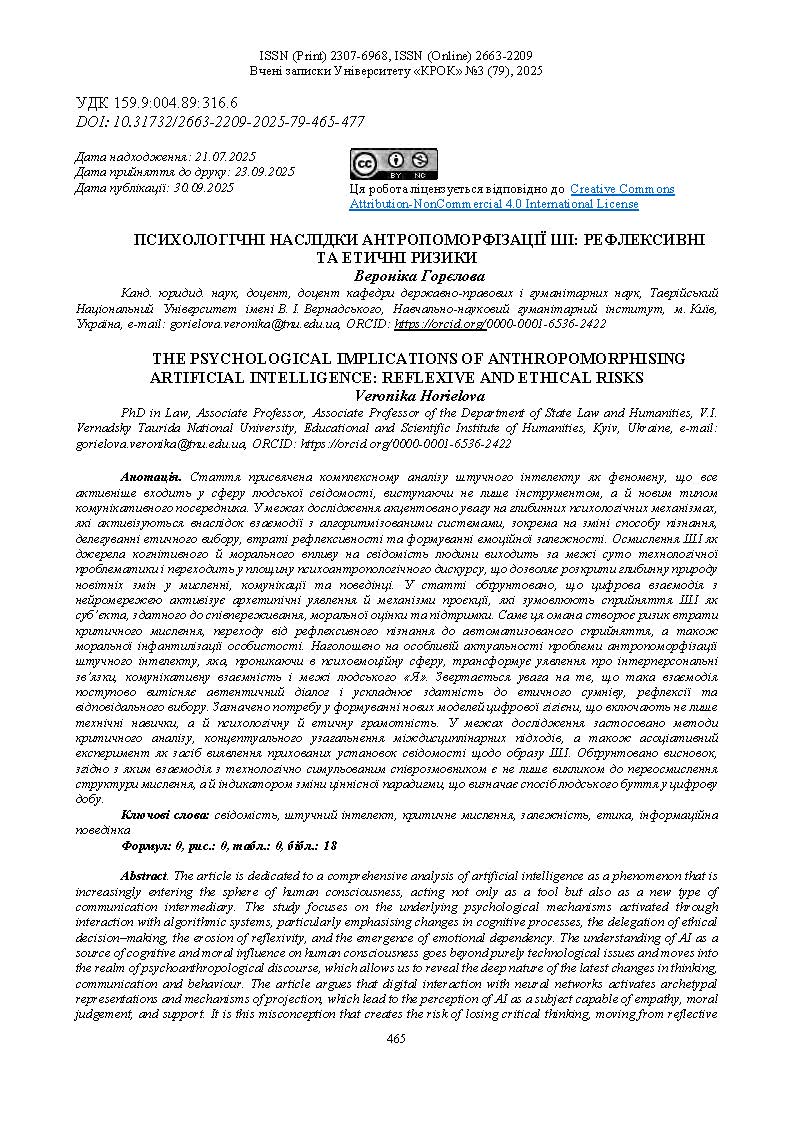ПСИХОЛОГІЧНІ НАСЛІДКИ АНТРОПОМОРФІЗАЦІЇ ШІ: РЕФЛЕКСИВНІ ТА ЕТИЧНІ РИЗИКИ
DOI:
https://doi.org/10.31732/2663-2209-2025-79-465-477Ключові слова:
свідомість, штучний інтелект, критичне мислення, залежність, етика, інформаційна поведінкаАнотація
Стаття присвячена комплексному аналізу штучного інтелекту як феномену, що все активніше входить у сферу людської свідомості, виступаючи не лише інструментом, а й новим типом комунікативного посередника. У межах дослідження акцентовано увагу на глибинних психологічних механізмах, які активізуються внаслідок взаємодії з алгоритмізованими системами, зокрема на зміні способу пізнання, делегуванні етичного вибору, втраті рефлексивності та формуванні емоційної залежності. Осмислення ШІ як джерела когнітивного й морального впливу на свідомість людини виходить за межі суто технологічної проблематики і переходить у площину психоантропологічного дискурсу, що дозволяє розкрити глибинну природу новітніх змін у мисленні, комунікації та поведінці. У статті обґрунтовано, що цифрова взаємодія з нейромережею активізує архетипічні уявлення й механізми проєкції, які зумовлюють сприйняття ШІ як суб’єкта, здатного до співпереживання, моральної оцінки та підтримки. Саме ця омана створює ризик втрати критичного мислення, переходу від рефлексивного пізнання до автоматизованого сприйняття, а також моральної інфантилізації особистості. Наголошено на особливій актуальності проблеми антропоморфізації штучного інтелекту, яка, проникаючи в психоемоційну сферу, трансформує уявлення про інтерперсональні зв’язки, комунікативну взаємність і межі людського «Я». Звертається увага на те, що така взаємодія поступово витісняє автентичний діалог і ускладнює здатність до етичного сумніву, рефлексії та відповідального вибору. Зазначено потребу у формуванні нових моделей цифрової гігієни, що включають не лише технічні навички, а й психологічну й етичну грамотність. У межах дослідження застосовано методи критичного аналізу, концептуального узагальнення міждисциплінарних підходів, а також асоціативний експеримент як засіб виявлення прихованих установок свідомості щодо образу ШІ. Обґрунтовано висновок, згідно з яким взаємодія з технологічно симульованим співрозмовником є не лише викликом до переосмислення структури мислення, а й індикатором зміни ціннісної парадигми, що визначає спосіб людського буття у цифрову добу.
Завантаження
Посилання
Декарт, Р. (2000). Метафізичні розмисли (З. Борисюк, Пер. з франц.). Юніверс. https://chtyvo.org.ua/authors/Dekart_Rene/Metafizychni_rozmysly
Кант, І. (2000). Критика чистого розуму (І. Бурковський, Пер. з нім.). Юніверс. https://chtyvo.org.ua/authors/Kant_Immanuel/Krytyka_chystoho_rozumu
Свідерська, О. І., & Дидів, І. В. (2021). Магічне мислення в цифрову епоху. Вісник НУОУ, (4(57)), 104–110.
Юнг, К. Г. (2018). Архетипи і колективне несвідоме (К. Котюк, Пер. з нім.; О. Фешовець, Наук. ред.; 2–ге опрац. вид.). Астролябія. Google Books
Polger, T. (2006). Natural minds. Psyche, 19(4), 539–556. ResearchGate
Jung, C. G. (1967). Symbols of transformation: An analysis of the prelude to a case of schizophrenia (Р. Ф. К. Галл, Пер. з нім.; 2-ге вид., випр.). Princeton University Press. Jungian Center
Mahari, R., & Pataranutaporn, P. (2025). Addictive intelligence: Understanding psychological, legal, and technical dimensions of AI companionship. MIT PubPub
Essel, H. B., Opoku, E. A., & Asamoah, D. (2024). ChatGPT effects on cognitive skills of undergraduate students. Education for Information, 40(2). ScienceDirect
Iqbal, U., & Iqbal, A. (2024). Assessing the effects of artificial intelligence on student cognitive skills. ResearchGate
Gerlich, M. (2024). Exploring motivators for trust in the dichotomy of human–AI trust dynamics. Social Sciences, 13(5), 251. MDPI
Çela, E., Binoshi, G., & Bino, N. (2024). Risks of AI–assisted learning on student critical thinking: A case study of Albania. International Journal of Digital Learning, 10(1). IGI Global
Jose, S., et al. (2025). The cognitive paradox of AI in education: Between enhancement and erosion. Frontiers in Psychology, 16. Frontiers
Singh, P. V. (2024). Bridging the gap: AI and the hidden structure of consciousness. ResearchGate
Mehrotra, A. (2025). The erosion of cognitive attention in the age of AI. Medium. Medium
Deliu, R. (2025). Cognitive dissonance artificial intelligence (CD–AI): The mind at war with itself. Harnessing discomfort to sharpen critical thinking. arXiv. arXiv
Lee, H.-P., Sarkar, A., Banks, R., & Rintel, S. (2025). The impact of generative AI on critical thinking: Self–reported reductions in cognitive effort and confidence effects. Microsoft Research. Microsoft
Frank, D.-A., & Otterbring, T. (2024). Consumer autonomy in generative AI services: The role of task difficulty and design in enhancing trust. Behavioral Sciences, 14(3), 205. MDPI
Psychological impacts of AI dependence: Assessing the cognitive and emotional costs of intelligent systems in daily life. (2025). ResearchGate

Downloads
Опубліковано
Як цитувати
Номер
Розділ
Ліцензія

Ця робота ліцензується відповідно до Creative Commons Attribution-NonCommercial 4.0 International License.

